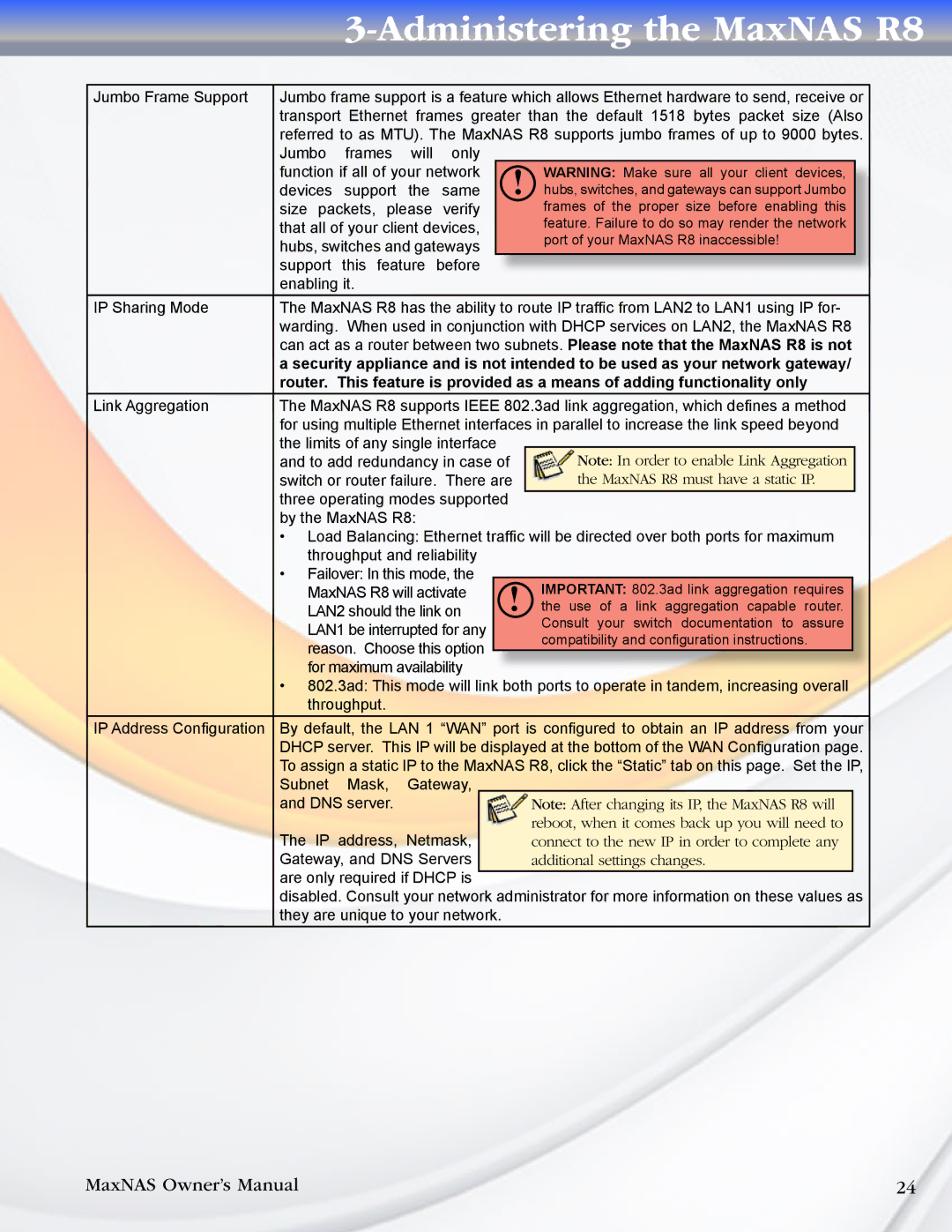
3-Administering the MaxNAS R8
Jumbo Frame Support | Jumbo frame support is a feature which allows Ethernet hardware to send, receive or |
| |||||||||
| transport Ethernet frames greater than the default 1518 bytes packet size (Also |
| |||||||||
| referred to as MTU). The MaxNAS R8 supports jumbo frames of up to 9000 bytes. |
| |||||||||
| Jumbo | frames | will | only |
|
|
|
| |||
| function if all of your network |
| ! | WARNING: Make sure all your client devices, |
|
| |||||
| devices | support | the | same |
| hubs, switches, and gateways can support Jumbo |
|
| |||
| size packets, please | verify |
|
| frames of the proper size before enabling this |
|
| ||||
| that all of your client devices, |
|
| feature. Failure to do so may render the network |
|
| |||||
| hubs, switches and gateways |
|
| port of your MaxNAS R8 inaccessible! |
|
| |||||
| support | this feature | before |
|
|
|
|
| |||
| enabling it. |
|
|
|
|
|
|
|
|
| |
IP Sharing Mode | The MaxNAS R8 has the ability to route IP traffic from LAN2 to LAN1 using IP for- |
| |||||||||
| warding. When used in conjunction with DHCP services on LAN2, the MaxNAS R8 |
| |||||||||
| can act as a router between two subnets. Please note that the MaxNAS R8 is not |
| |||||||||
| a security appliance and is not intended to be used as your network gateway/ |
| |||||||||
| router. This feature is provided as a means of adding functionality only |
| |||||||||
Link Aggregation | The MaxNAS R8 supports IEEE 802.3ad link aggregation, which defines a method |
| |||||||||
| for using multiple Ethernet interfaces in parallel to increase the link speed beyond |
| |||||||||
| the limits of any single interface |
|
|
|
| ||||||
| and to add redundancy in case of |
| Note: In order to enable Link Aggregation |
|
| ||||||
| switch or router failure. There are | the MaxNAS R8 must have a static IP. |
|
| |||||||
| three operating modes supported |
|
|
|
| ||||||
| by the MaxNAS R8: |
|
|
|
|
|
|
|
| ||
| • Load Balancing: Ethernet traffic will be directed over both ports for maximum |
| |||||||||
| throughput and reliability |
|
|
|
| ||||||
| • Failover: In this mode, the |
|
|
|
|
|
| ||||
| MaxNAS R8 will activate |
|
| ! | IMPORTANT: 802.3ad link aggregation requires |
|
| ||||
| LAN2 should the link on |
|
| the use of a link aggregation capable router. |
|
| |||||
| LAN1 be interrupted for any |
|
|
|
| Consult your switch documentation to assure |
|
| |||
|
|
|
| compatibility and configuration instructions. |
|
| |||||
| reason. Choose this option |
|
|
|
|
|
| ||||
|
|
|
|
|
|
|
| ||||
| for maximum availability |
|
|
|
|
| |||||
|
|
|
|
|
| ||||||
•802.3ad: This mode will link both ports to operate in tandem, increasing overall throughput.
IP Address Configuration By default, the LAN 1 “WAN” port is configured to obtain an IP address from your DHCP server. This IP will be displayed at the bottom of the WAN Configuration page. To assign a static IP to the MaxNAS R8, click the “Static” tab on this page. Set the IP, Subnet Mask, Gateway,
and DNS server.
The IP address, Netmask, Gateway, and DNS Servers are only required if DHCP is
disabled. Consult your network administrator for more information on these values as they are unique to your network.
MaxNAS Owner’s Manual | 24 |
